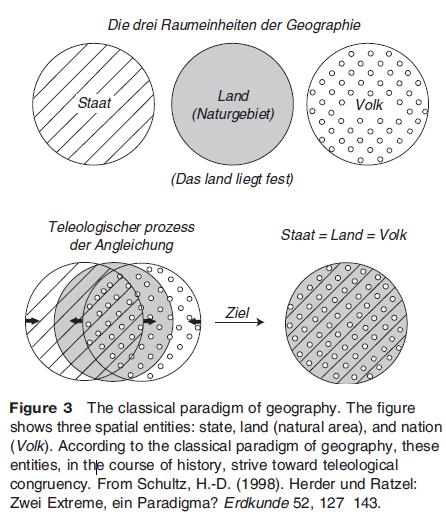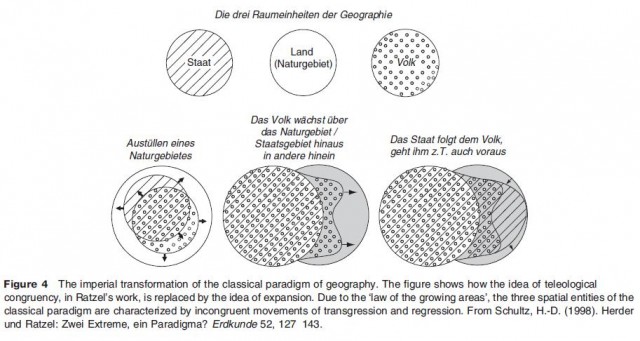Anthropogeography as Imperialist Transformation of the Classical Paradigm of Geography
It is against the background of the competing geographical imaginations that Hans Dietrich Schultz sees a ''cycle of growth and defeat, of progress and collapse'' at work in Ratzel's writings (Schultz, 1998: p. 140). Since the surface of the Earth is limited, the natural impulse of growth necessarily leads to a form of spatial implosion which, in turn, represents the starting point for another process of growth and, again, defeat and collapse. According to Schultz, this cycle indicates a transformation of the classic concept of geography which is both theoretical and political in nature.
With the Lebensraum concept having a decisively expansionist dimension, Ratzel theoretically departs from the classical paradigm of geography which, in turn, rested upon the idea of a close relationship between humankind, on the one hand, and nature, on the other hand. Revolving around the concept of Ganzheit or 'wholeness' as it had been developed by the philosopher Johann Gottfried Herder and reproduced, for example, by the early geographer Carl Ritter, the classical paradigm regards the region (Land or Landschaft) as individual and unique part of the Earth's surface. As Figure 3 shows, the rationale behind the classical paradigm assumes a harmonization between a given 'natural land', its Volk, and the related state.

While this harmonization is to a certain extent reproduced in Ratzel's writings (e.g., when he writes about the Earth's many limbs fighting uniformity), it is at the same time clearly disrupted in his 'law of the growing areas'. By assuming an eternal 'struggle for space', Herder's idea of a 'fraternal community' or a 'brotherhood of nations' in which all nations stick to their own limited national territory, competing peacefully in the pursuit of humanity, is dismissed. Instead, Ratzel adapts the classical paradigm – which had been customized to the process of nation building – to the political circumstances of his own era, that is, the age of imperialism. In so doing, he develops a rather bellicose concept which, to Schultz, represents nothing less than a shift from ''eternal peace'' to ''eternal war'' (Schultz, 1998: 127; see Figure 4).

It does not come as a surprise, therefore, that the expansionist imagination has political effects. The applicability of Ratzel's theoretical ideas to late nineteenthcentury German Tagespolitik becomes obvious, for instance, in a passage written in 1898 on the naval question and Germany's position as a world power: ''There will always be ruling nations and serving nations [Vo?lker],'' Ratzel maintained, suggesting an essential choice for a Volk as being ''either a hammer or an anvil:''
Whether they [Vo?lker] become one or the other depends on their recognising in good time the demands which the world situation presents to a nation which is striving to rise. It has been a different exercise for the Prussia of the eighteenth century to attain its position as a major power [GroXmachtstellung] in the middle of the European continental powers than it is for Germany in the nineteenth century to assert itself among the world powers. This task can no longer be solved in Europe alone; only as a world power can Germany hope to secure for its people the land which it needs for growth. Germany must not remain apart from the transformations and redistributions taking place in all parts of the world (y) if it does not want to run the risk again, like in the 16th century, of being pushed into the background for a series of generations. (Ratzel, 1906: pp. 377 378)
- Competing Geographical Imaginations
- Darwinian Concepts
- Is Geography an Independent Discipline?
- Tracing Anthropogeography in Ratzel’s Work and Life
- Friedrich Ratzel
- Anthropogeography (After Ratzel)
- Antarctica: Conclusion
- Growing Focus on Biological Prospecting
- Imagining Antarctica as a World Park: Regulating Tourism